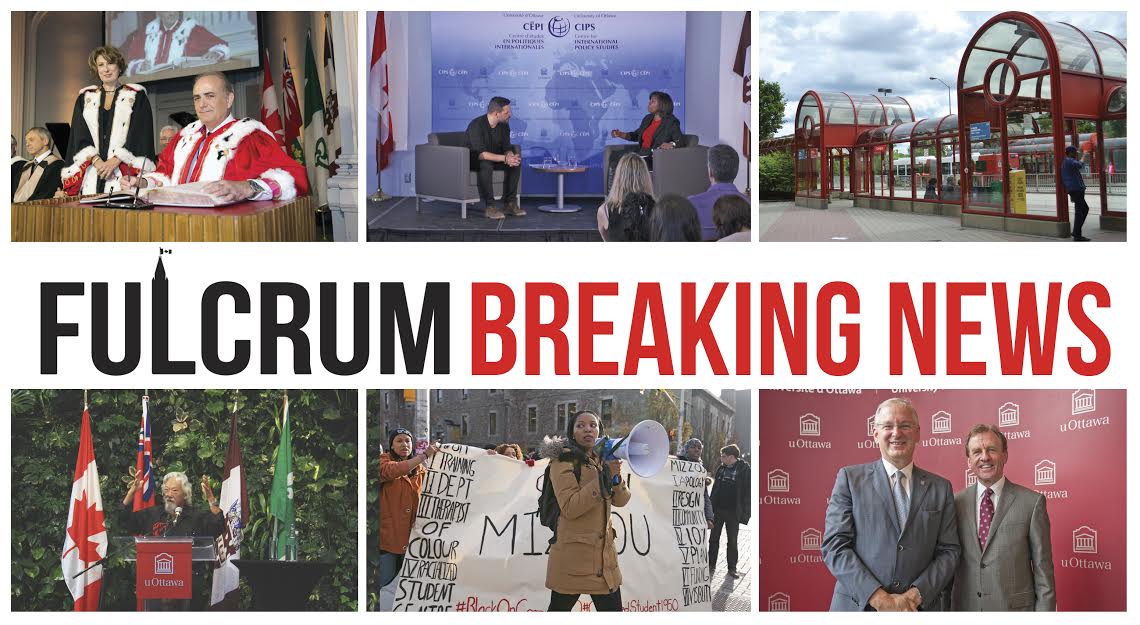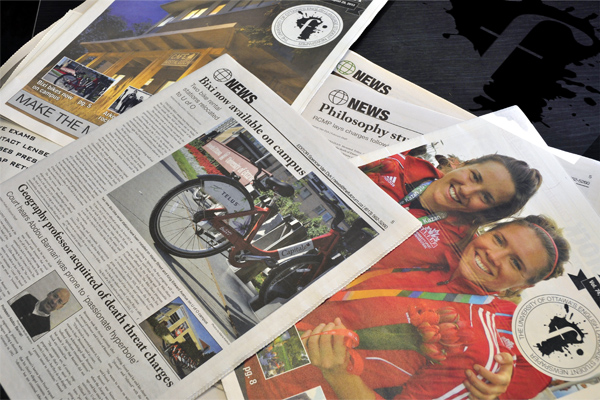UOSU, BSLA, 16 student governments say administration ‘fails to address systemic racism in a meaningful way’
Groups from across the University of Ottawa campus released an open letter to president Jacques Frémont on Monday night saying the administration “fails to address systemic racism in a meaningful way” and listing eight demands for action.
The signing groups include the University of Ottawa Students’ Union (UOSU), the Black Student Leaders Association (BSLA), the Ontario Public Interest Research Group (OPIRG), CUPE 2626 (which represents teaching and research assistants), Women in Science and Engineering (WISE), and 16 student governments.
The organizations say they are “appalled and angered” by the carding of two Black students on campus in the past four months. The letter is backed by 41 signatures, including both students who were carded.
The letter outlines the most recent incident from mid-September when education student Wiliston Mason was carded inside the residence building where he lives and works by a security officer. The incident came just two weeks after the university introduced anti-discrimination and anti-racism measures.
“I kept repeating myself, making it very clear that he did not have my permission, the right or the authority to do what he was doing,” Mason told the Fulcrum in an interview on Sept. 14. The officer in question is now banned from campus and is employed by a private firm under contract with the university, the administration says.
“This is the second-known carding incident that has taken place on campus in the past (four) months, demonstrating how deeply rooted anti-Black racism is at this institution,” the letter reads. “Racialized students and community members constantly and continuously experience the effects of racism in all aspects of their university experience.”
The organizations outline several demands for action in the letter.
OPEN LETTER TO THE OFFICE OF PRESIDENT JACQUES FRÉMONT by Matt Gergyek on Scribd
The first is an apology to Mason and Jamal Koulmiye-Boyce, a student who was carded and handcuffed by Protection Service officers in June, while also acknowledging that the incidents were not separate events and “part of a larger system of racial discrimination that exists at the institution.”
A report from an independent investigation released last week found race, insufficient training and outdated procedures played a role in the way Koulmiye-Boyce was treated.
The second demand is to review the interim directive of section 8 of Policy 33, which governs carding on campus.
The groups ask the university to rework the policy so students never have to show proof of ID, unless under “exceptional” circumstances that must be defined within the policy and in line with the Ontario Human Rights Commission and court rulings.
Under the current policy, Protection Services officers are allowed to ask for proof of identification but “requesting identification must never be requested randomly and arbitrarily and should not be Protection Services’ routine practice.”
The letter calls for widespread anti-racism and anti-oppression training for all university staff, including professors, employees, Protection Services officers, and private security officers. This training should be recurring, publicly available, reviewed on a regular basis, and supported by a fixed portion of the university’s budget, the groups say in the letter.
The BSLA, the BIPOC Caucus of Association of Professors of the University of Ottawa (APUO), and UOSU-established student resources ask to be a part of the university’s plan to address anti-Black racism on campus.
They are also asking for an accessible forum to be held by the administration so that racialized students may voice their concerns and suggestions to ensure they “are taken seriously and are acted upon.”
The organizations also demand that the university introduce accountability measures.
“This should include — but not be limited to — enforcing permanent bans on officers who engage in racial discrimination on campus, and proper notification to those involved in the incident,” the letter reads.
The letter asks for transparency “in all matters pertaining to racialized students’ safety,” including making the minutes and meeting information of the President’s Committee for a Discrimination Free-Campus publicly available.
The letter calls for the representation of the BSLA, the BIPOC Caucus of the APUO, the UOSU, and student governments on the committee as well.
The organizations call for data to be collected on racialized students to better understand and explain “their lived experience of racism,” while boosting diversity in university staff and members of Protection Services.
The UOSU also states in the letter that they believe the university is falling short in supporting racialized students. They encourage students to contact equity commissioner Judy El-Mohtadi or reach out to the executive of a student government for support.
“The requirement for a strengthened, resilient community network is needed now more than ever,” the letter reads.
“The Central Administration must rethink, reform and improve on the measures that have been taken to address anti-black racism, and more broadly systemic racism on campus. We urge the administration to make the appropriate acts of reconciliation that respond to racialized students’ concerns. The University of Ottawa must do better.”
The U of O has received the open letter and “welcomes student engagement on this very important issue,” the administration said in an emailed statement to the Fulcrum Tuesday afternoon.
The statement says the administration has invited Koulmiye-Boyce and the Black Law Students’ Association to join the university’s anti-discrimination committee. The administration also met with the UOSU “to discuss best ways forward,” according to the statement.
The statement says the report from the second part of the investigation into the carding of Koulmiye-Boyce, which will examine the impacts of Protection Services’ policies and procedures on racialized people, will be made public and hopefully released in November.
“The university is committed to ensure that everyone feels safe and welcomed on uOttawa campus,” the statement reads.” Students can play a big role in achieving this objective.”
Read More:
- Timeline: U of O’s response to June carding, racial discrimination incident
- Carding of Black U of O student was racial discrimination, investigation finds
- U of O student carded by security officer in his own residence building
- Students find gaps in U of O’s anti-racism, anti-discrimination measures
The Fulcrum has reached out to the U of O administration for comment. This article will be updated as necessary.




